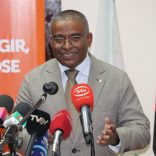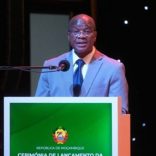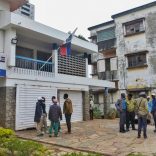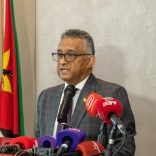Mozambique: Opposition wanted public consultation on 2025-44 ENDE National Development Strategy - ...
President Nyusi dismisses controversial police commander

President Nyusi yesterday dismissed the general commander of the Police of the Republic of Mozambique (PRM), Jorge Khalau, a statement by the presidency has announced.
The statement does not give a reason for Khalau’s removal after more than seven years in office or name a successor to head an institution that has become known for its inability to control organized crime and corruption in its ranks.
This decision comes just days after the president said the capacity of the defence and security forces needed increasing, announcing recently at a police graduation ceremony that: “Only trained men, specialized and equipped with patriotic ethical and professional values, can give the best of themselves for the sake of a better future for all.”
On Tuesday, at the opening of the judicial year, President Nyusi referred to the urgency of restructuring the Criminal Investigation Police (PIC), a sub-structure of the PRM.
“The government, the justice sector and Parliament should join in seeking a solution to the PIC. The law goes through all these, hence they should speed up the process,” said the head of state, who the same day acknowledged there were indications of organized and international crime in Mozambique.
A controversial figure, Jorge Khalau was severely criticized in 2012 when the police refused to obey a court order to release agents involved in an arms seizure case. Khalau said that the police did not obey judges and had their own rules, generating outrage among opposition parties and human rights organizations.
Although Khalau has recently advocated a “cleansing of the ranks”, the Mozambican police have been negatively reported by international organizations for human rights violations including summary execution, arbitrary arrest, torture and excessive use of force.
The wave of abductions in Maputo involving police since 2011 and unsolved crimes like the 2015 murder of Franco-Mozambican constitutionalist lawyer and academic Gilles Cistac have also contributed to the deterioration of the police force’s image, along with minor corruption such as the extortion of bribes from motorists and reports of police weapons be rented out to criminals.
At the opening of the 2015 judicial year, Chairman of the Mozambican Bar Association Tomas Timbane warned that the police constituted “one of the weakest links” in the Mozambican state.
“The police do not exist to show service; they are there to serve us. We see the police detain citizens without any kind of proof, we see detainees with obvious signs of violence, arrested without warrant though not in flagrante delicto,” Timbane said in a hard-hitting speech to an audience which included Jorge Khalau.
“If we do not want the alternative to the rule of law to prevail, that is, that arbitrariness reigns, we urgently need to reform the police,” Timbane said.
The police have been back in the spotlight recently in the escalation of political violence in Mozambique, with the opposition Renamo (Mozambique National Resistance) reporting alleged attempts by defence and security forces to assassinate its leader, Afonso Dhlakama, in September and October 2015, and its secretary-general, Manuel Bissopo in January of this year.
Police rejected these claims at the time, but the cases remain unsolved.













Leave a Reply
Be the First to Comment!
You must be logged in to post a comment.
You must be logged in to post a comment.